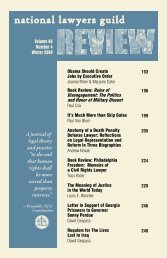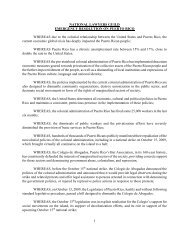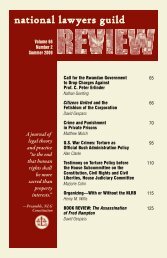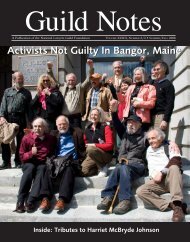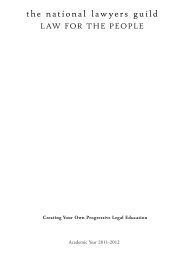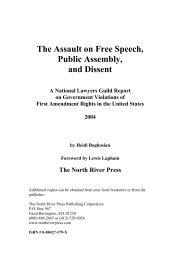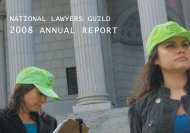NLGRev 68-2[1].indd - National Lawyers Guild
NLGRev 68-2[1].indd - National Lawyers Guild
NLGRev 68-2[1].indd - National Lawyers Guild
Create successful ePaper yourself
Turn your PDF publications into a flip-book with our unique Google optimized e-Paper software.
112 national lawyers guild review<br />
So, while the formal policy of the United States continues to be to support<br />
collective bargaining in order to raise the wages of working people, states like<br />
South Carolina, Oklahoma, and Tennessee have pursued their own policies<br />
of discouraging collective bargaining and driving down rank-and-file wages.<br />
Of course, in their effort to compete with each other for business, states do<br />
more than rely upon their anti-union climate. States also offer tax breaks<br />
and other forms of corporate welfare to lure businesses across state lines.<br />
For instance, South Carolina offered Boeing an incentive package that has<br />
been valued at over $900 million in order to secure Boeing’s $750 million<br />
investment in the North Charleston facility. 21<br />
South Carolina’s investment in Boeing points to tension between Republican<br />
talking points and reality regarding this case. Republican politicians<br />
have painted the case as an Obama administration attack on free enterprise.<br />
Leaving aside that Lafe Solomon is actually a career employee who has<br />
worked at the agency for over 35 years, the Republicans have picked an<br />
especially odd poster child for the virtues of free enterprise. Boeing’s very<br />
existence is due in large part to government contracts and billions of dollars<br />
of corporate welfare.<br />
For instance, over a fifteen year period from 1991 to 2005, the Department<br />
of Defense provided Boeing with $45 billion in research, development,<br />
testing and evaluation funding. 22 Earlier this year, the World Trade Organization<br />
issued a report finding that Boeing had received at least $5.3 billion<br />
in government subsidies to develop the 787 Dreamliner—the very aircraft<br />
at issue in the NLRB complaint. 23 It takes a fair amount of chutzpah to take<br />
billions of dollars from the government and then turn around and complain<br />
if the government raises questions about how you run your business.<br />
But, just as there has been a long history in this country of socializing<br />
losses and privatizing gains, we also have socialized investment for private<br />
gain. No one screams about government interference in the free market when<br />
the government is offering subsidies to business. But, if the government is<br />
going to invest in the success of a particular corporation, is it really too much<br />
to ask that the corporation comply with federal labor law?<br />
As Solomon has taken pains to point out, there is nothing particularly<br />
novel or far-fetched about the government’s case against Boeing. The NLRA<br />
makes it illegal for an employer to retaliate against workers because they<br />
struck in the past. Here, Boeing executives announced that they were locating<br />
new production work in South Carolina instead of Washington “due to<br />
strikes happening every three to four years in Puget Sound.”<br />
Boeing executives and the Republicans in Congress are arguing that the<br />
Board is overreaching because the dispute is about new work rather than the


![NLGRev 68-2[1].indd - National Lawyers Guild](https://img.yumpu.com/30820772/50/500x640/nlgrev-68-21indd-national-lawyers-guild.jpg)
